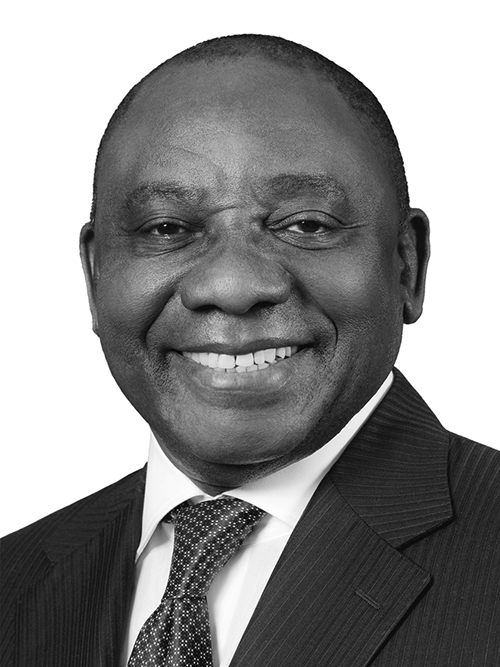Statement by H.E. Cyril Ramaphosa, President of the Republic of South Africa and outgoing Coordinator of CAHOSCC Committee of African Heads of State and Government on Climate Change (CAHOSCC)

His Excellency Macky Sall, President of the Republic of Senegal, Chairperson of the African Union,
His Excellency Moussa Faki Mahamat, Chairperson of the African Union Commission,
Your Excellencies, Heads of State and Government,
Honourable Ministers,
Ladies and Gentlemen,
Good Morning,
It is my pleasure to address this meeting of the Committee of African Heads of State and Government on Climate Change.
The COVID-19 pandemic has set back back multilateral processes, including around climate change.
It is imperative that we do not lose momentum, and that climate change is not relegated to the periphery of the global development agenda.
Africa is experiencing the worst impacts of phenomena associated with global warming such as droughts, floods and cyclones. Climate change impacts are costing African economies between 3 and 5 per cent of their GDP’s. Despite not being responsible for causing climate change, it is Africans who are bearing both the brunt and the cost.
It is with pride that we can say that Africa spoke with one voice at COP26 in Glasgow late last year.
A number of key outcomes and successes were achieved.
The conclusion of the Paris Agreement Work Programme which will provide a basis for Parties to implement fully the Paris Agreement, in the context of a Just Transition and Sustainable Development, and leaving no one left behind.
The complex Glasgow Climate Pact strives to strike the right balance by accommodating the differing national circumstances and capacities amongst the nearly two hundred Parties. The aim is that all are enabled and empowered to contribute their fair share as well as to enhance their climate ambition.
Glasgow further sends a clear signal that the world will be safer under the 1.5 degree temperature rise scenario, compared to 2 degrees or more.
Developed economy countries have agreed to support the implementation of Just Transitions that promote sustainable development, poverty eradication, and the creation of decent work and quality jobs.
Much more work needs to be done for Africa and the world to keep global temperature rise to 1.5 degrees Celsius by the end of the century.
It is still of concern that the necessary financial flows to enable developing economy countries in particular to mitigate and adapt to the impacts of climate change remain vastly inadequate.
Africa’s Special Needs and Circumstances need to be recognized globally because of our natural resource based economies, and owing to high levels of poverty, unemployment and underdevelopment.
Such a decision will unlock the necessary financial flows to our continent as we embark on Just Transitions towards a low-carbon future.
As we prepare for the UN Framework Convention on Climate Change COP27 taking place in the Arab Republic of Egypt in November, Africa must once more speak with one voice, expressing their unwavering support for the implementation of the UNFCCC and the Paris Agreement, and for the primacy of multilateralism.
COP26 recognizes our right to develop our own development pathways towards shared global objectives, based on our national circumstances and the guiding principles of the UNFCCC. Foremost amongst them is equity, and the principle of Common But Differentiated Responsibilities and Respective Capabilities.
We must promote and defend this, as well as the right of all African and other developing countries to support in the form of finance, technology and capacity building.
A one-size-fits-all approach to complex issues such as a transition from fossil fuels that disregards the realties on the ground in Africa will simply not work, and is neither just nor equitable.
To achieve the expected results for Africa at COP27, it is imperative that we develop a strong and well-coordinated Common African Position, and that we formulate a set of robust key messages that encapsulate Africa’s aspirations.
Most importantly, we must continue to work together in the spirit of unity and solidarity.
I wish to take this opportunity to highlight some of the achievements mentioned in this report, namely
• The finalization of the African Climate Change and Resilient Development Strategy and Action Plan 2022-2032 that will be launched during this meeting. It provides a broad outline for harmonised and coordinated actions to respond to the impacts of climate change, as well as to plan for the continent’s low-emission and climate-resilient future.
• Work that has been done on advancing the Africa Adaptation Initiative. The AAI has successfully evolved into a promising vehicle for achieving transformative adaptation results for African countries.
• The programme of work of the Africa Renewable Energy Initiative has continued. This is a transformative and Africa-led effort to accelerate and scale up harnessing the continent’s huge renewable energy potential
• The outcomes of the engagements, and progress on resource mobilization for Africa’s Climate Programmes by the three Climate Commissions, as well as planned activities.
• The report includes the African Green Stimulus Programme, as well as the African Union Green Recovery Action Plan. These plans were developed during the past two years, and seek to harness the opportunities that a green recovery of the continent can deliver.
Excellencies,
South Africa’s term as coordinator of CAHOSCC has now come to a close.
I wish to take this opportunity to express my appreciation and gratitude to the both the African Group of Negotiators on Climate Change and the African Ministerial Conference on the Environment for their hard work.
They developed the Common African Position on Climate Change ahead of COP26 and promoted and defended Africa’s interests at the global climate change negotiations. This sterling work will have an impact for generations to come.
The nations of the world can only address the global climate change crisis by working together. All Parties should honour their undertakings and commitments, and base their climate actions and policies on latest available science. They should furthermore respect the UNFCCC’s guiding principles.
I thank you.




